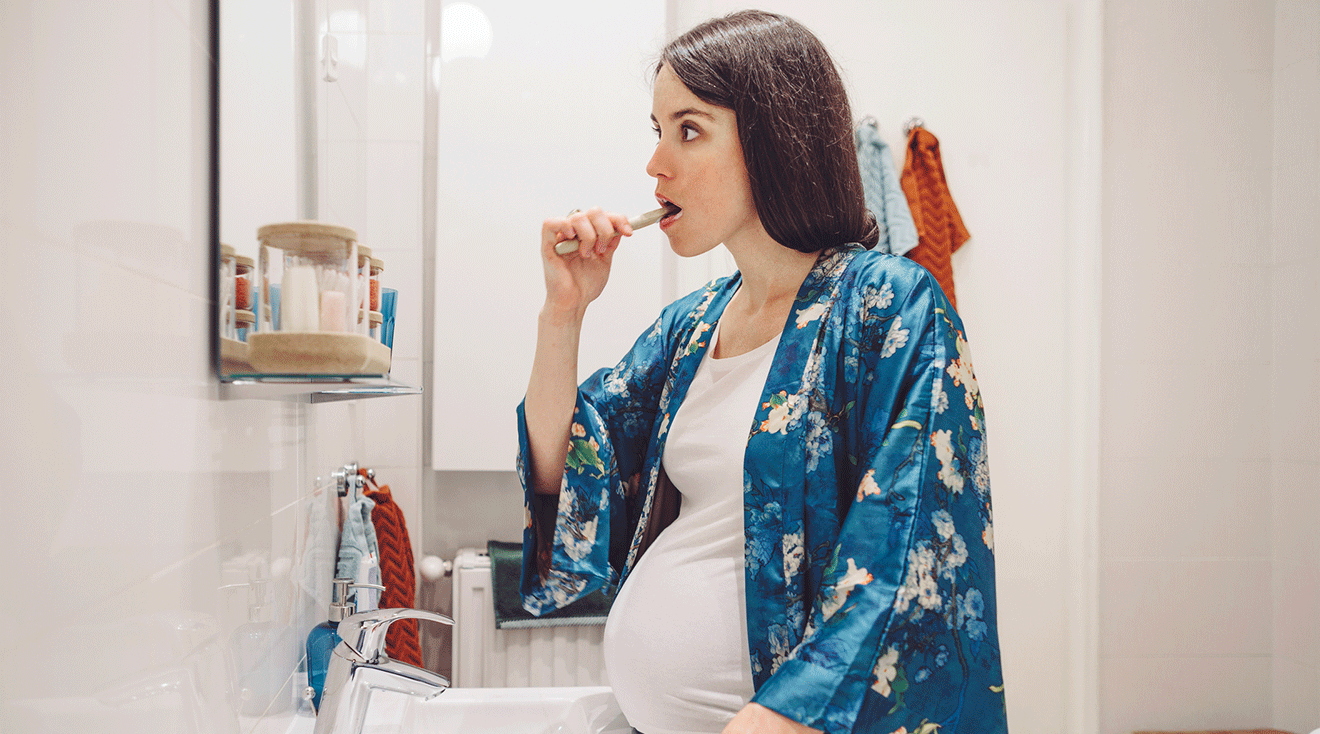Pregnancy Gingivitis: What to Do About Bleeding Gums During Pregnancy
Expanding breasts and bellies are par for the course in pregnancy, and swollen feet are a common complaint. But swollen gums during pregnancy are, unfortunately, also not uncommon.
It’s normal for your gums to be more tender than usual during this time, but if you’re dealing with regular bleeding, it’s time to get things checked out. Here’s why some moms-to-be and pregnant people have bleeding gums during pregnancy—aka pregnancy gingivitis—plus what you can do to prevent this condition, and when to see your dentist. (Hint: It never hurts to have your mouth checked out!)
Bleeding gums are common during pregnancy. In fact, about 60 to 75 percent of expectant moms have pregnancy gingivitis, according to the American Dental Association (ADA).
“Bleeding gums in pregnancy are common because there are hormonal changes that occur that change the body’s response to the bacteria in your mouth,” says Stefanie Russell, DDS, MPH, PhD, director of the New York University/Bellevue Prenatal Oral Health Program and clinical associate professor at the New York University College of Dentistry. “It’s super common, but it’s still not considered a good thing.”
The condition can also cause some complications, says Erin Fraundorf, DMD, MS, founder of BOCA Orthodontic + Whitening Studio in Greater St. Louis: “It’s extremely important to take care of your oral health while you’re pregnant, as lingering infections can be very harmful to your baby,” she says.
Pregnancy gingivitis can start earlier in your pregnancy, says Mark Wolff, DDS, PhD, dean of the University of Pennsylvania School of Dental Medicine. “It may start late in the first trimester and continue—or start any time—during the remainder of the pregnancy,” he says.
There are a few different potential causes of bleeding gums during pregnancy, according to the experts:
- Hormones. The increase of estrogen and progesterone in your body during pregnancy can cause your gums to swell and become inflamed, Wolff says. “They may become fragile and bleed when touched or brushed,” he says.
- Bacteria. “Your body will always respond to bacteria in your mouth, but because of hormonal changes, you’re more likely to have bleeding and inflammation during pregnancy,” Russell says.
- Morning sickness. “Some pregnant people experience nausea and aversions to various smells and tastes, sometimes toothpaste,” says Fraundorf. “Those with morning sickness may also have a heightened gag reflex and decrease their brushing frequency or quality due to this.”
- Decreased brushing and flossing. Sometimes the stress of pregnancy might make you forget to brush or floss. Or, bleeding gums might actually make you more averse to brushing and flossing. Unfortunately, that can make things worse. “This is very bad,” Wolff says. “The condition gets worse.”
If you’re dealing with bleeding gums during pregnancy, there are a few things you can do. Wolff recommends brushing carefully to clean your teeth below the gumline, and flossing or using water irrigation (aka small brushes designed to go between the teeth).
If you suspect you might have pregnancy gingivitis, it’s important to see a dentist. “Dentists may clean the teeth to remove tartar, recommend mouthwashes and even recommend antibiotics if the gums are badly infected,” Wolff says. “Don’t ignore the bleeding, swelling and redness.”
Russell says that good oral hygiene is “key” to lowering your risk of pregnancy gingivitis. “Have a cleaning,” she says. “Keep up on your dental care.” That includes brushing regularly and flossing.
“Use a soft brush and dental floss to clean between your teeth. That’s often where the inflammation starts,” Russell adds.
Wolff stresses the importance of continuing to take care of your dental health during pregnancy. That means brushing your teeth at least twice a day for two minutes with a fluoride toothpaste and toothbrush that has soft bristles, according to the ADA. It’s also a good idea to replace your toothbrush every three to four months or when the bristles are frayed.
If you’re struggling with morning sickness, Russell recommends rinsing your mouth with water or a combination of warm water and baking soda after throwing up. “Don’t brush right after vomiting,” she says. “The enamel may be weakened and brushing may make it worse.”
Wolff recommends booking an appointment with your dentist as soon as you experience bleeding gums, or within a few days if it doesn’t go away with good oral hygiene.
Russell agrees. “It’s important to have it treated,” she says. “You could have underlying periodontal disease.”
It can be hard to deal with bleeding gums during pregnancy on top of everything else you’re managing. But taking good care of your teeth and seeing a dentist if things don’t improve is crucial. “If you’re pregnant and experiencing bleeding gums or other symptoms of gingivitis, it’s imperative that you see your dentist for an evaluation, cleaning and any necessary treatment,” says Fraundorf.
Please note: The Bump and the materials and information it contains are not intended to, and do not constitute, medical or other health advice or diagnosis and should not be used as such. You should always consult with a qualified physician or health professional about your specific circumstances.
Plus, more from The Bump:
Erin Fraundorf, DMD, MS, is the founder of BOCA Orthodontic + Whitening Studio in Greater St. Louis. She earned her Doctor of Medicine in Dentistry from University of Louisville School of Dentistry.
Stefanie Russell, DDS, MPH, PhD, is the director of the New York University/Bellevue Prenatal Oral Health Program and a clinical associate professor at the New York University College of Dentistry. She earned her PhD in epidemiology from Yale University, a Master’s of Public Health from University of Connecticut School of Medicine and a Doctor of Dental Surgery from University of Maryland.
Mark Wolff, DDS, PhD, is the dean of the University of Pennsylvania School of Dental Medicine. He earned his PhD in oral biology and pathology from the State University of New York at Stony Brook, and a Doctor of Dental Surgery from the State University of New York at Stony Brook School of Dental Medicine.
American Dental Association, Pregnancy Increases Risk of Gum Disease
American Dental Association, Toothbrushes, October 2022
American Dental Association, Floss/Interdental Cleaners, September 2021
Learn how we ensure the accuracy of our content through our editorial and medical review process.
Navigate forward to interact with the calendar and select a date. Press the question mark key to get the keyboard shortcuts for changing dates.




















































